Module1Unit2
- 格式:ppt
- 大小:1.64 MB
- 文档页数:16
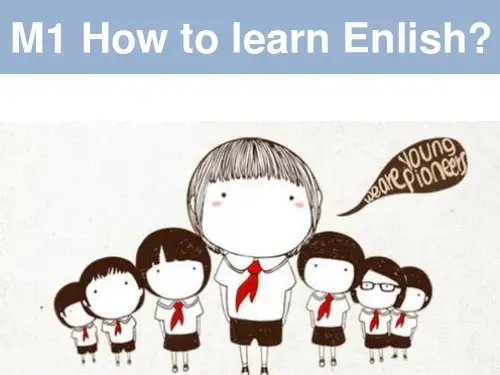
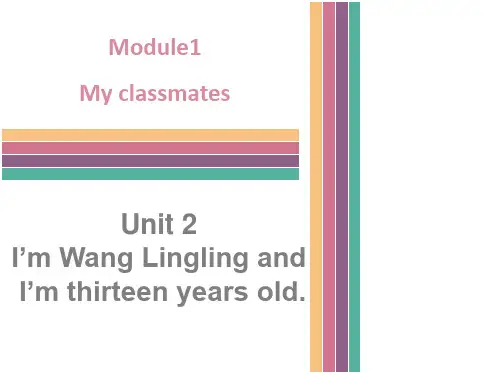
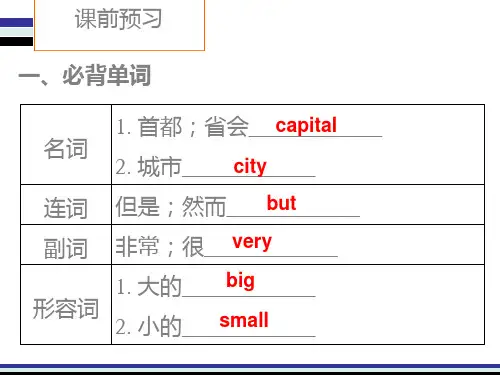
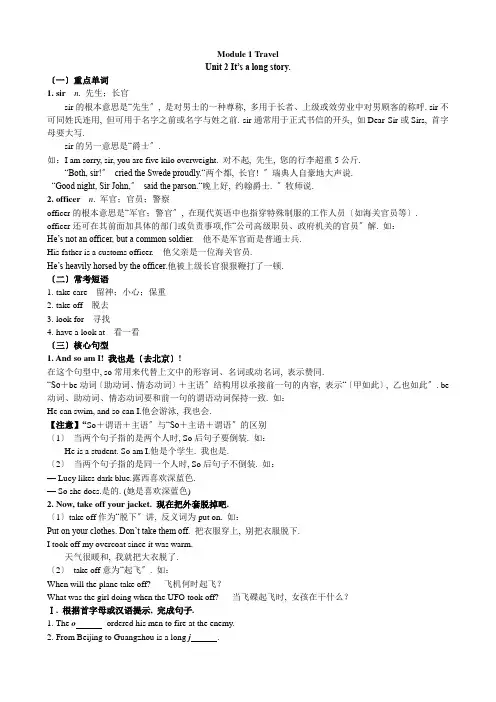
Module 1 TravelUnit 2 It’s a long story.〔一〕重点单词1. sir n. 先生;长官sir的根本意思是“先生〞, 是对男士的一种尊称, 多用于长者、上级或效劳业中对男顾客的称呼. sir不可同姓氏连用, 但可用于名字之前或名字与姓之前. sir通常用于正式书信的开头, 如Dear Sir或Sirs, 首字母要大写.sir的另一意思是“爵士〞.如:I am sorry, sir, you are five kilo overweight. 对不起, 先生, 您的行李超重5公斤.“Both, sir!〞cried the Swede proudly.“两个都, 长官! 〞瑞典人自豪地大声说.“Good night, Sir John,〞said the parson.“晚上好, 约翰爵士. 〞牧师说.2. officer n. 军官;官员;警察officer的根本意思是“军官;警官〞, 在现代英语中也指穿特殊制服的工作人员〔如海关官员等〕. officer还可在其前面加具体的部门或负责事项,作“公司高级职员、政府机关的官员〞解. 如:He’s not an officer, but a common soldier. 他不是军官而是普通士兵.His father is a customs officer. 他父亲是一位海关官员.He’s heavily horsed by the officer.他被上级长官狠狠鞭打了一顿.〔二〕常考短语1. take care 留神;小心;保重2. take off 脱去3. look for 寻找4. have a look at 看一看〔三〕核心句型1. And so am I! 我也是〔去北京〕!在这个句型中, so常用来代替上文中的形容词、名词或动名词, 表示赞同.“So+be动词〔助动词、情态动词〕+主语〞结构用以承接前一句的内容, 表示“〔甲如此〕, 乙也如此〞. be 动词、助动词、情态动词要和前一句的谓语动词保持一致. 如:He can swim, and so can I.他会游泳, 我也会.【注意】“So+谓语+主语〞与“So+主语+谓语〞的区别〔1〕当两个句子指的是两个人时, So后句子要倒装. 如:He is a student. So am I.他是个学生. 我也是.〔2〕当两个句子指的是同一个人时, So后句子不倒装. 如:— Lucy likes dark blue.露西喜欢深蓝色.— So she does.是的. (她是喜欢深蓝色)2. Now, take off your jacket. 现在把外套脱掉吧.〔1〕take off作为“脱下〞讲, 反义词为put on. 如:Put on your clothes. Don’t take them off. 把衣服穿上, 别把衣服脱下.I took off my overcoat since it was warm.天气很暖和, 我就把大衣脱了.〔2〕take off意为“起飞〞. 如:When will the plane take off? 飞机何时起飞?What was the girl doing when the UFO took off? 当飞碟起飞时, 女孩在干什么?Ⅰ. 根据首字母或汉语提示, 完成句子.1. The o ordered his men to fire at the enemy.2. From Beijing to Guangzhou is a long j .3. My home isn’t very big, but very c .4. Would you like to try this j (夹克) on for size, sir?Ⅱ.单项填空.( ) 1. I was so tired this morning that I couldn’t ______ early as usual.A. get upB. get onC. get off( ) 2. —What are you doing?—I’m the key to the door.A. finding outB. looking afterC. looking for( ) 3. John had a short walk after lunch, ______?A. did heB. didn’t heC. had he( ) 4. —Excuse me. Can I take a seat here?—______. The woman who sat here will be back soon.A. We’d better not.B. No, thank you.C. I’m afraid you can’t.( ) 5.—I hope the summer vacation will come soon.—_______.It’s really relaxing.A. So do IB. So I doC. So did IⅢ.根据所给汉语完成以下句子, 每空一词.1. 你真好,来帮助我们.It ______ ______ ______ you to help us.2. 他大了, 能照顾自己了.He's old enough to ______ ______ ______ himself.3. 无论多热,他也不会脱掉外衣.However hot it is, he will not ______ ______ his coat.4. 让我们瞧一瞧你们的电子机算机.Let's ______ ______ ______ your electronic computer.5. 她上了公车, 找了个最前面的座位.She ______ ______ the bus and picked a seat up front.Ⅳ.阅读理解.While travelling, you’ll be taking money, license or passport. Or you will buy something expensive to take back home with you and you don’t want it to get stolen. Here are some ideas on how to keep your valuables(贵重物品) safe while traveling.Plan ahead of timeThink of what you really need and don’t need to take on your trip. Only take the valuables that you must have, not just ones that you would like to have.Carry your valuables on your personSomething that is small, like cash and credit cards and your passport, can be carried in a money wallet around your neck or in a money belt. This way, your valuables are hidden and right next to you, where you know where they are at all times. Wear clothing that can hide the money belt.Carry larger valuables in your carry-on bagIf you can’t fit it in your money wallet like some large valuables, you’d better put them somewhere that you will keep touch with them. Your can put them on the plane, so you don’t have to worry about the airline losing your bag or someone stealing it from the belt after the flight before you get to it.Choose a hotel that has the front desk for valuablesThis way, you don’t have to worry about housekeeping getting hold of your valuables, or someone stealing your valuables if your room is broken into. If you give the valuables to the front desk to keep for you, choose a time when others are not looking.( ) 1. The passage is mainly about ______.A. what to do while travelingB. how to carry your valuables on your personC. how to keep your valuables safe while traveling( ) 2. You can carry all of the following valuables on your person EXCEPT ______.A. your cashB. credit cardsC. your large valuables( )3.Which kind of hotel can you choose while traveling according to the text?A. You can choose a hotel with a lot of housekeepers for valuables.B. You can choose a hotel with the front desk for valuables.C. You can choose some cheap hotel.( ) 4.When you plan your travel ahead of time, you should make sure that ____.A. you take valuables that you must haveB. you take valuables as many as possibleC. you take valuables that you would like to have( ) 5. Which of the following is TRUE according to the text?A. Anything small must be carried in a money wallet around your neck.B. You give valuables to the front desk at a hotel when others are looking.C. You’d better put some large valuables in your carry-on bag.〔一〕重点单词1. stupid adj. 笨的;糊涂的stupid主要指缺乏理智, 指先天迟钝、智力低下, 也可指因醉酒或疾病而导致头脑麻木. 在句中可用作定语, 也可用作表语.stupid用作表语时, 如主语是动词不定式, 那么通常用形式主语it结构, 该动词不定式的逻辑主体由介词of引出. 如:He is so stupid that he can't so much as eat. 他蠢得甚至连吃饭都不会.I'll have none of your stupid ideas!我决不同意你的愚蠢想法.It is stupid of him to make the same mistake twice. 他真实傻瓜, 两次犯同样的错误.〔二〕常考短语1. too…to… 太…而不能…2. ask for 请求;要求3. get off 下车4. say goodbye to和…说再见5. sit down 坐下〔三〕核心句型1. Li Lin says goodbye to his brother Li Wei. 李林向他哥哥说再见.say“说〞, 是及物动词必须带宾语, 强调说话的内容.Did he say anything? 他说什么事情了吗?I want to say nothing but sorry. 我只想说对不起.I'd like to say goodbye to you all. 我想向你们大家辞别了.say构成的短语有:say a few words 说几句话say goodbye to 和……说再见say hello to 向……表示问候Ⅰ.根据句意及所给汉语提示完成句子, 每空词数不限.1. However hot it is, he will not (脱掉) his coat.2. You must (小心) not to hurt yourself.3. Mr. john, will you like to (看一看) our showroom?4. You can (寻找) the book in the library catalog.5. It (非常好) you to give me the book.Ⅱ.口语运用.A: Hi, you’re traveling here, aren’t you?B: Yes, I am. (1)A: I’m traveling here, too. When did you arrive?B: (2)A: I’ve just arrived. (3)B: Yes. I enjoyed it very much.A: How long will you stay here?B: (4) Then I’ll go to France and England.A: Oh, that’s great! I’ll go there, too. Can I go with you?Ⅲ.阅读短文, 根据短文内容和首字母提示写出文中所缺单词.A young man was traveling. It was getting late in the day, and he was t 1 . When he met an old man on the road, he asked him, “Excuse me, wher e can I get w 2 , sir? 〞The old man told him, “Walk along the road and you’ll see a small r 3 .〞Then the old man added, “If you pick up some pebbles(卵石;小圆石) from the river bed, you will get both glad and s 4 .〞The young man t 5 the old man and went on his way. When it got dark, he found the river and took a d 6 . He thought it was silly to pick up pebbles, b 7 he still picked some up. He then found a p 8 to sleep.The next morning the young man found those pebbles became beautiful, bright jewels (珠宝). So he ran back to the river q 9 to get more, but there were only sands.Looking at the beautiful jewels, he felt s 10 that he hadn’t picked up more. At that time he was happy that he had picked some up.1. 2. 3. 4. 5.6. 7. 8. 9. 10.Unit 3 Language in useTeaching aims:1.Master all the new words and phrases.2.Master all the new language points and sentences.一、用括号内所给形容词的适当形式填空1. The street is as _________(long)as that one.2. Mike is ___________(thin) than his brother.3.The Nanjing Road is the _______________(crowd)street in Shanghai.4. The library of this school has ___________(many )novels than those of the other school.5. Math is not so _______________(interesting)as history.6. My __________(old)sister is two years_______(old)than I.7. We’ll try our best to do the work with _______(little )money and ________(few) people.8. Cathy did quite ___________ in English competition, and I did even _________(well).二、单项选择1. Beijing is becoming _________ and __________.A. more beautiful; moreB. beautiful; beautifulC. more; more beautifulD. more beautiful; more beautiful2. ________ children there are in a family , ________ their life will be.A.The less; the betterB. The fewer; the betterC. Fewer; richerD. More; poorer3. ________, he was given a good job.A. becauseB. as a resultC. because ofD. as a result of4. She was late _______ the heavy traffic.A. becauseB. as a resultC. because ofD. as a result of5. It’s _________ to listen to light music when you feel tired.A. dangerousB. scaryC. relaxingD. difficult6. – How many girls are there in your class?-- _______them ________over twenty.A. A number of ; areB. The number of; areC. A number of; isD. The number of; is7.—Some children can’t afford ________ necessary stationary.--- Let’s donate our pocket money to them.A. buyB. buyingC. to buyD. to bought三、翻译句子1.人们砍伐了太多的树木, 结果环境恶化了.People cut down too many trees. ___________ __________ ___________ the environment is getting worse. 2. 最近我们听到了很多有关那位年轻演员的事.We have ___________ a lot _____________ the young actor recently.3. 看到我的家乡发生了很大的变化, 我很满意.I ____________ very _________ ____________ ___________ that great changes have taken place in my hometown.4. 你应该在外面玩而不应该在屋里工作.You should be out playing ___________ ___________ working indoors.5. 当他到达火车站的时候, 火车已经开了.________ __________ __________ he got to the train station, the train had left.四、任务型阅读As we know, everyone can make mistakes, but don't worry about it. The following is what we should do when we make mistakes.Firstly, just admit (成认) it. Don't think that our mistakes are caused by others. Be brave and face the fact thatwe have made the mistakes. Don't blame other people, and don't cheat (欺骗) ourselves, either. (1) After we make mistakes, we can prevent them disturbing us by laughing at ourselves.Secondly, (2)_________ _________at once. In order to stop the problem from getting worse, we should act quickly to solve it. If we don't act and deal with the problem quickly, it'll only make us feel more stressed. Also it is necessary to make a plan of action and correct the mistake according to it. So decide quickly and act!Thirdly, realize that making mistakes is the best way to learn. Those who have made the most mistakes can get an A, for they are the ones who have learned the most. The more we learn from our mistakes, the cleverer we are. And lastly, think about what we can learn from our mistakes. What caused us to make the mistake? How can we avoid〔防止〕making the same mistake in the future? When we act with a method〔方法〕to get a good result, do it that way next time. If we don't, we should stop, think about it, change it and try again. (2021 泰州)1.把(1)句译成中文._______________________________________________________________2.在(2)句的空白处分别填入一个适当的词使句意完整、上下文通顺._______________________________________________________________3.答复以下问题:What should we do if we don't get a good result with a method?_______________________________________________________________4.在文中找出与If we learn more from our mistakes, we will become cleverer.意思相近的句子.________________________________________________________________5.在文中找出最能表达该短文主题的句子, 并将它写在答题卡上.___________________________________________________________________。
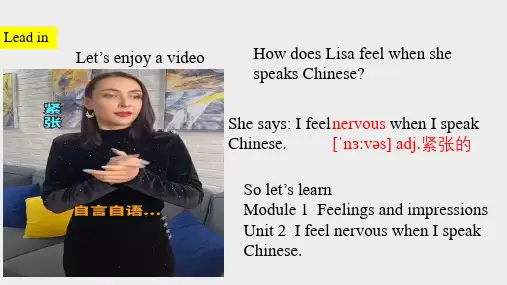
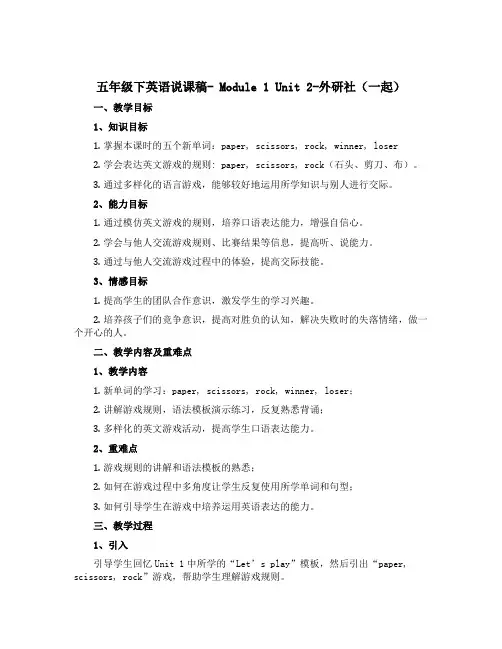
五年级下英语说课稿- Module 1 Unit 2-外研社(一起)一、教学目标1、知识目标1.掌握本课时的五个新单词:paper, scissors, rock, winner, loser2.学会表达英文游戏的规则: paper, scissors, rock(石头、剪刀、布)。
3.通过多样化的语言游戏,能够较好地运用所学知识与别人进行交际。
2、能力目标1.通过模仿英文游戏的规则,培养口语表达能力,增强自信心。
2.学会与他人交流游戏规则、比赛结果等信息,提高听、说能力。
3.通过与他人交流游戏过程中的体验,提高交际技能。
3、情感目标1.提高学生的团队合作意识,激发学生的学习兴趣。
2.培养孩子们的竞争意识,提高对胜负的认知,解决失败时的失落情绪,做一个开心的人。
二、教学内容及重难点1、教学内容1.新单词的学习:paper, scissors, rock, winner, loser;2.讲解游戏规则,语法模板演示练习,反复熟悉背诵;3.多样化的英文游戏活动,提高学生口语表达能力。
2、重难点1.游戏规则的讲解和语法模板的熟悉;2.如何在游戏过程中多角度让学生反复使用所学单词和句型;3.如何引导学生在游戏中培养运用英语表达的能力。
三、教学过程1、引入引导学生回忆Unit 1中所学的“Let’s play”模板,然后引出“paper, scissors, rock”游戏,帮助学生理解游戏规则。
2、新词学习出示单词卡片,加以说明和展示,重在讲解单词的读音和基本释义,形成词汇记忆,提升学生单词运用能力。
3、语法对话讲解重点讲解游戏规则,以及与游戏有关的常用句子。
引领学生模仿英文对话,反复练习发音和表达,培养学生的口语表达能力。
4、多样化的英文游戏在教师的带领下,安排适合年龄的游戏,如模拟比赛,竞技赛,分组活动等等。
通过这些游戏,提高学生的英语应用能力,锻炼学生的语言交流及沟通能力和团队协作精神。
5、总结及作业回顾和总结今天所学内容,强化巩固。
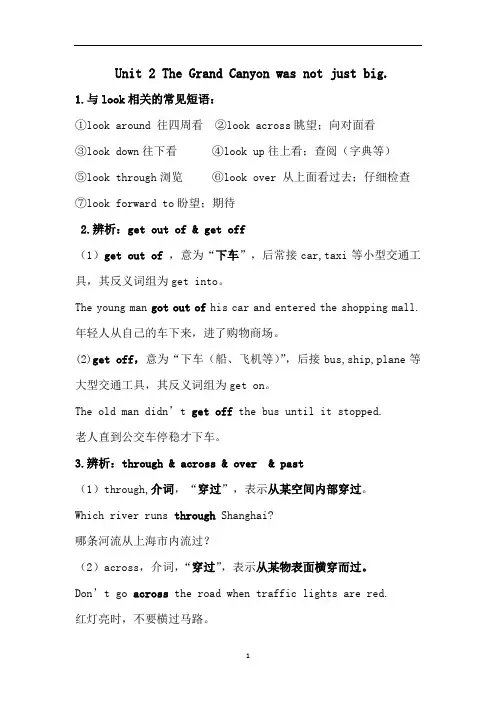
Unit 2 The Grand Canyon was not just big.1.与look相关的常见短语:①look around 往四周看②look across眺望;向对面看③look down往下看④look up往上看;查阅(字典等)⑤look through浏览⑥look over 从上面看过去;仔细检查⑦look forward to盼望;期待2.辨析:get out of & get off(1)get out of,意为“下车”,后常接car,taxi等小型交通工具,其反义词组为get into。
The young man got out of his car and entered the shopping mall. 年轻人从自己的车下来,进了购物商场。
(2)get off,意为“下车(船、飞机等)”,后接bus,ship,plane等大型交通工具,其反义词组为get on。
The old man didn’t get off the bus until it stopped.老人直到公交车停稳才下车。
3.辨析:through & across & over & past(1)through,介词,“穿过”,表示从某空间内部穿过。
Which river runs through Shanghai?哪条河流从上海市内流过?(2)across,介词,“穿过”,表示从某物表面横穿而过。
Don’t go across the road when traffic lights are red.红灯亮时,不要横过马路。
(3)over,介词,“越过”,表示从某物上方越过。
Jump over the fire and be careful.小心跳过火堆。
(4)past,介词,“经过”,表示从某地旁边经过。
I go past a big supermarket on my way to school.在我上学的路上,我要经过一家大型超市。
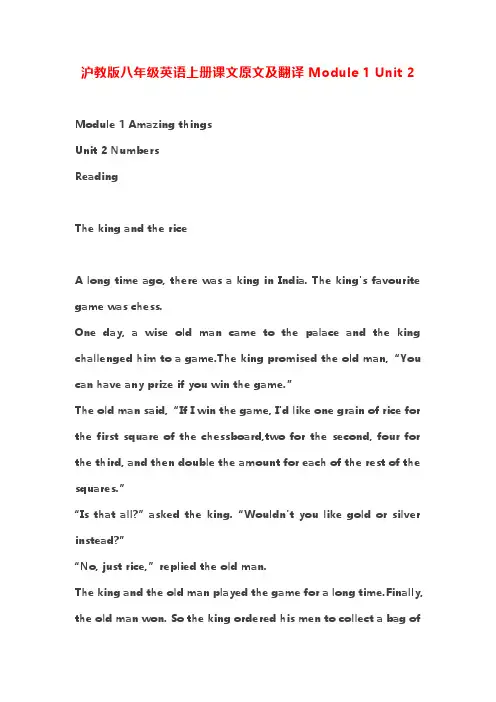
沪教版八年级英语上册课文原文及翻译Module 1 Unit 2Module 1 Amazing thingsUnit 2 NumbersReadingThe king and the riceA long time ago, there was a king in India. The king's favourite game was chess.One day, a wise old man came to the palace and the king challenged him to a game.The king promised the old man, “You can have any prize if you win the game.”The old man said, “If I win the game, I'd like one grain of rice for the first square of the chessboard,two for the second, four for the third, and then double the amount for each of the rest of the squares.”“Is that all?”asked the king. “Wouldn't you like gold or silver instead?”“No, just rice,”replied the old man.The king and the old man played the game for a long time.Finally, the old man won. So the king ordered his men to collect a bag ofrice.He put one grain on the first square, two on the second, and so on.The king quickly realized the problem -- even with all the rice in the country, he would still not have enough rice to put on all the squares!国王和米很久以前,印度有一个国王。
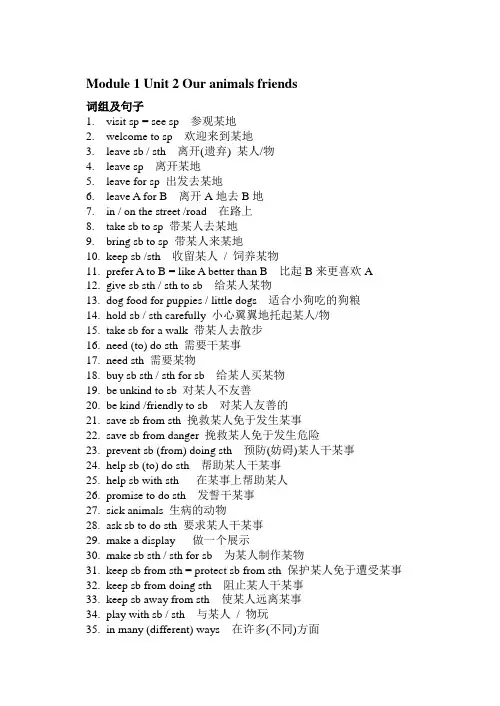
Module 1 Unit 2 Our animals friends词组及句子1.visit sp = see sp 参观某地2.welcome to sp 欢迎来到某地3.leave sb / sth 离开(遗弃) 某人/物4.leave sp 离开某地5.leave for sp 出发去某地6.leave A for B 离开A地去B地7.in / on the street /road 在路上8.take sb to sp 带某人去某地9.bring sb to sp 带某人来某地10.keep sb /sth 收留某人/ 饲养某物11.prefer A to B = like A better than B 比起B来更喜欢A12.give sb sth / sth to sb 给某人某物13.dog food for puppies / little dogs 适合小狗吃的狗粮14.hold sb / sth carefully 小心翼翼地托起某人/物15.take sb for a walk 带某人去散步16.need (to) do sth 需要干某事17.need sth 需要某物18.buy sb sth / sth for sb 给某人买某物19.be unkind to sb 对某人不友善20.be kind /friendly to sb 对某人友善的21.save sb from sth 挽救某人免于发生某事22.save sb from danger 挽救某人免于发生危险23.prevent sb (from) doing sth 预防(妨碍)某人干某事24.help sb (to) do sth 帮助某人干某事25.help sb with sth 在某事上帮助某人26.promise to do sth 发誓干某事27.sick animals 生病的动物28.ask sb to do sth 要求某人干某事29.make a display 做一个展示30.make sb sth / sth for sb 为某人制作某物31.keep sb from sth = protect sb from sth 保护某人免于遭受某事32.keep sb from doing sth 阻止某人干某事33.keep sb away from sth 使某人远离某事34.play with sb / sth 与某人/ 物玩35.in many (different) ways 在许多(不同)方面36.cross the road = walk across the road 穿过马路37.bring sth to sp 把某物带来某地38.blind people 盲人39.missing people 失踪的人40.on the farm 在农场上41.I’m an SPCA officer. 我是爱护动物协会的工作人员。
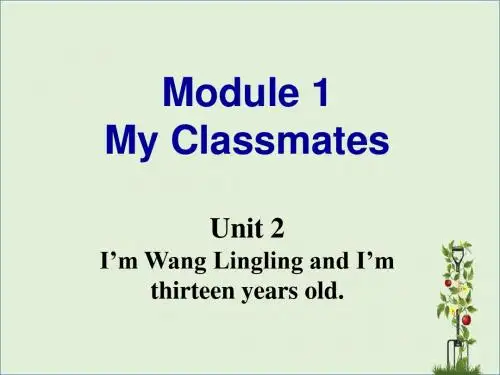
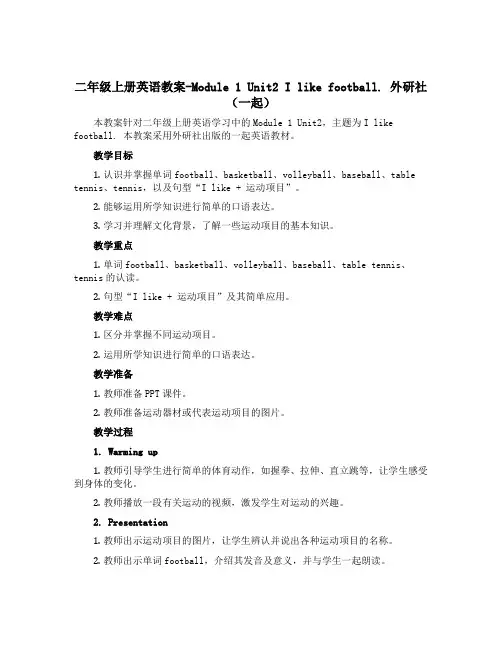
二年级上册英语教案-Module 1 Unit2 I like football. 外研社(一起)本教案针对二年级上册英语学习中的Module 1 Unit2,主题为I like football. 本教案采用外研社出版的一起英语教材。
教学目标1.认识并掌握单词football、basketball、volleyball、baseball、table tennis、tennis,以及句型“I like + 运动项目”。
2.能够运用所学知识进行简单的口语表达。
3.学习并理解文化背景,了解一些运动项目的基本知识。
教学重点1.单词football、basketball、volleyball、baseball、table tennis、tennis的认读。
2.句型“I like + 运动项目”及其简单应用。
教学难点1.区分并掌握不同运动项目。
2.运用所学知识进行简单的口语表达。
教学准备1.教师准备PPT课件。
2.教师准备运动器材或代表运动项目的图片。
教学过程1. Warming up1.教师引导学生进行简单的体育动作,如握拳、拉伸、直立跳等,让学生感受到身体的变化。
2.教师播放一段有关运动的视频,激发学生对运动的兴趣。
2. Presentation1.教师出示运动项目的图片,让学生辨认并说出各种运动项目的名称。
2.教师出示单词football,介绍其发音及意义,并与学生一起朗读。
3.教师出示图片,让学生根据图片描述运动项目,引导学生掌握单词basketball、volleyball、baseball、table tennis、tennis。
4.教师引导学生学习并掌握句型“I like + 运动项目”,并进行简单的语音练习。
3. Practice1.在黑板上写出“We like football.”,让学生进行朗读,并引导学生根据模板创作新句子,如“We like basketball.”、“I like volleyball.”等。
同步讲义Module 1 Unit 2词汇1.take care 当心,小心2.sir [sɜ:(r)] 先生3.officer [ˈɒfɪsə(r)] 军官,官员4.stupid [ˈstju:pɪd] 笨的5.take off 脱去,起飞6.jacket [ˈdʒækɪt] 短上衣,夹克句子1.Li Lin and Li Wei are on the station platform, saying goodbye to each other. 李林和李薇在车站站台上告别。
2.Take care. 保重。
3.I’m afraid you’re sitting in my seat. 恐怕您坐了我的座位。
4.I can’t hear very well. 我听不太清楚。
5.He is surprised to see Li Lin. 看到李林他很吃惊。
6.Sit down and make yourself comfortable. 舒舒服服地坐下来。
单元语法名词、冠词、数词1.Li Lin and Li Wei are on the station platform, saying goodbye to each other. 李林和李薇在车站站台上告别。
【知识点1】say … to sb.对某人说…【拓展】say goodbye to sb. 对某人说再见say hello to sb. 对某人说你好He said goodbye us at the end of the trip.A.at B.to C.for D.with 知识精讲【知识点2】each other互相2.Take care. 保重。
【知识点】take care多保重;当心;注意;小心= be careful …或look out【拓展】take care of… = look after …照顾3.I’m afraid you’re sitting in my seat. 恐怕您坐了我的座位。
Unit2 知识点总结单词短语重点分析1、ask for 请求(给予)They didn’t need to ask for help.ask for advice 征求建议ask sb. for sth. “向某人要某物”。
如:He asked his parents for a motorbike. 2、time n. 次;回(可数名词)。
several times 几次n. 时间(不可数名词)。
some time 一些时间3、quickly adv. 快地;迅速地。
由形容词变为副词,一般在词尾加ly。
sad — sadly; bad — badly;slow — slowly;happy — happily4、natural adj. 合理的;合乎常情的。
nature n.自然5、suggest v. 建议;提议。
后接名词,动词-ing或that + 从句。
n. suggestion 建议课文重点句型分析:1、smile at … 对……微笑(善意的):laugh at … 嘲笑……(恶意)2、 Send your questions to Diana.send sth. to sb. 发送某物给某人3、… how to improve their English.“疑问词+ 动词不定式”,可做宾语或主语。
I don’t know where to sit.Do you know how _________ (improve) your English?4、 like doing sth. 相当于enjoy doing sth. 喜欢做某事I like playing basketball, but I don’t enjoy _________ (play) football.a good/great way to do sth. 做某事的好方法I think watching English films is a good way _________ (learn) English well.5、 Each time you will learn something new.something new 一些新的东西“不定代词+ 形容词”,形容词放在不定代词之后做后置定语。
外研版英语八(下)Module 1 Feelings and impressions 知识点详解Unit 2 I feel nervous when I speak Chinese.★(A2).【知识点再现】Welcome to China. 欢迎来到中国【知识点1】Welcome to+地点。
意为“欢迎来到某地”。
如:Welcome to Guilin. 欢迎来到桂林。
★(A2).【知识点再现】Thanks for your last message. 谢谢你的上一封邮件。
【知识点2】thanks for意为“因……而感谢某人”,相当于thank you for。
for是介词,意为“因为”,其后接名词、代词或动名词作宾语。
thanks to意为“多亏了,由于”。
如:Thanks /Thank you for your help. 谢谢你的帮助。
Thanks /Thank you for your pencil. 谢谢你的铅笔。
Thanks/Thank you for helping me. 谢谢你帮助我。
Thanks/Thank you for making us see sense. 谢谢你让我明白了道理。
【知识点3】【辨析】message,information与news的用法辨析:①message含义较广,可指书面、口头、无线电等多种渠道传来的信息,因而有“消息、口信、电报”等意思,为可数名词。
message的常用搭配:get/receive a message收到信息;leave a message留言;send a message发送信息;take a message捎口信。
如:He left a message for you. 他给你留言了。
I have an important message for you. 我有一条重要的信息要告诉你。
②information作“信息”解,通常指在阅读、观察、谈话或书信往来中特别关注的消息、情报、资料等。